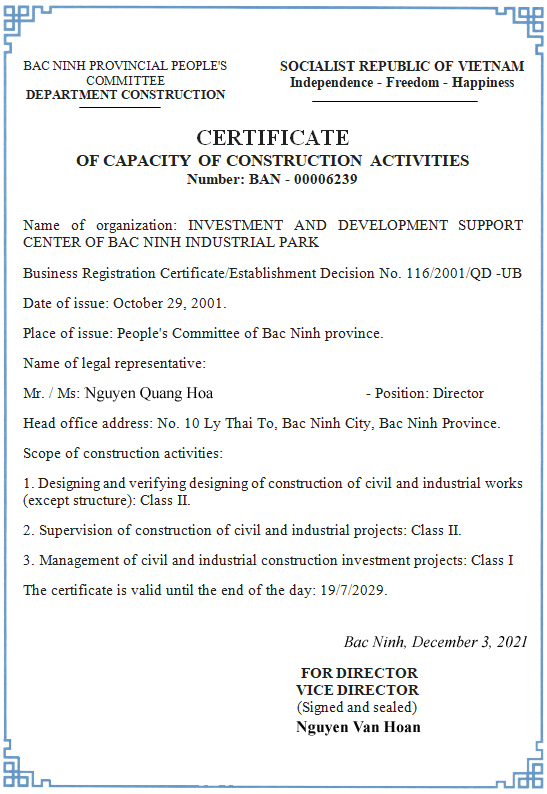
The area of Bac Ninh used to be named Kinh Bac for a long time and was named Bac Ninh in the Nguyen Dynasty (1823). According to the historical line with different names such as Bo, Lo, Tran ... to 1831, Bac Ninh town changed to Bac Ninh province. Since then, Bac Ninh has officially been listed on the map of administrative units as a province of Vietnam. In 1963, Bac Ninh province was merged with Bac Giang province to become Ha Bac province, from January 1, 1997, Bac Ninh province was re-established.
Currently, Bac Ninh province has an area of 822.7 km2, located at the northern gateway of Hanoi capital, in the triangle of economic growth in Hanoi - Hai Phong - Quang Ninh. According to the December 2018 Statistical Y earbook, Bac Ninh's population is 1,247,454 people, of which men accounts for 49.2%, women accounts for 50.8%. The province has 8 administrative units, including: Bac Ninh City, Tu Son Town and 6 districts: Tien Du, Yen Phong, Thuan Thanh, Que Vo, Gia Binh and Luong Tai with 126 commune-level administrative units, including 94 communes, 26 wards and 6 towns.
Bac Ninh has favorable transportation system connecting with regional provinces such as the 1A national highway linking with Ha Noi – Bac Ninh – Lang Son; the highway No.18 linking Noi Bai International Airport – Bac Ninh – Ha Long; national highway No. 38 conecting Bac Ninh – Hai Duong – Hai Phong; the cross – national railway system through Bac Ninh to Lang Son and China; the waterway of Cau River, Duong River and Thai Binh River which is favorable to connect Bac Ninh with the system of regional river ports and seaports, making Bac Ninh an open location going along with the development of Ha Noi capital towards constructing satellite cities and the industrial allocation of Ha Noi.. These are favorable conditions for economic - cultural - social development and external exchanges.
After more than 20 years of re-establishment, from a pure agricultural province, Bac Ninh has basically become an industrial province in the direction of modernization, with many socio-economic indicators leading in the top of the country. In 2019, the economy is comprehensively developed, gross regional domestic product (GRDP) slightly increased by 1.1% with the scale continuing to rank the 7th nationwide, reached VND 119,832 billion (at 2010 constant price). The per capita GRDP reached USD 6,163, or 2.23 times higher than the national average and ranked 2nd compared with the whole country. Per capita income reached VND 73.3 million, ranking the fifth in the whole country.
In 2019, State budget revenue was estimated at VND 29,912 billion, exceeding VND 2,515 billion compared to the yearly estimate, up 6.5% compared to 2018, of which, domestic revenue was estimated at VND 23,662 billion, exceeding VND 2,515 billion of the estimate, up 8%; revenue from foreign-invested enterprises was VND 8,900 billion, exceeding VND 100 billion and up 10.3%.
The value of industrial production reached VND 1.07 million (at 2010 constant price), of which, the foreign-invested economic sector was estimated at VND 991.2 trillion. Maintain the first position compared to the whole country in terms of production scale. The production value of agriculture, forestry and fishery products was VND 8,223 billion (at 2010 constant price), reaching 91.9% of the year plan.
The province has created jobs for 27,200 workers (including 1,877 laborers to work abroad), the percentage of trained workers increased to 72%. The rate of poor households decreased to 1.27%.
As a land famous for its rich cultural history, Bac Ninh is known as the homeland of traditional festivals. There are about 500 big and small festivals held in all seasons of the year ... Besides, Bac Ninh is the homeland of the Quan Ho folk song, which is typical for the Northern folk song with deep regional characteristics. Quan ho Bac Ninh today has become a valuable cultural heritage of Viet Nam.
The achievements achieved after more than 20 years of construction, innovation and development of Bac Ninh are not only the joy and pride of every people in the province but also the motivation and the premise for the entire Party Committee, authorities and people to continue striving and making efforts to take Bac Ninh to a new height and become Bac Ninh City directly under the Central Government 20 years of the XXI century in the spirit of the Resolution of the XIX Provincial Party Congress.






